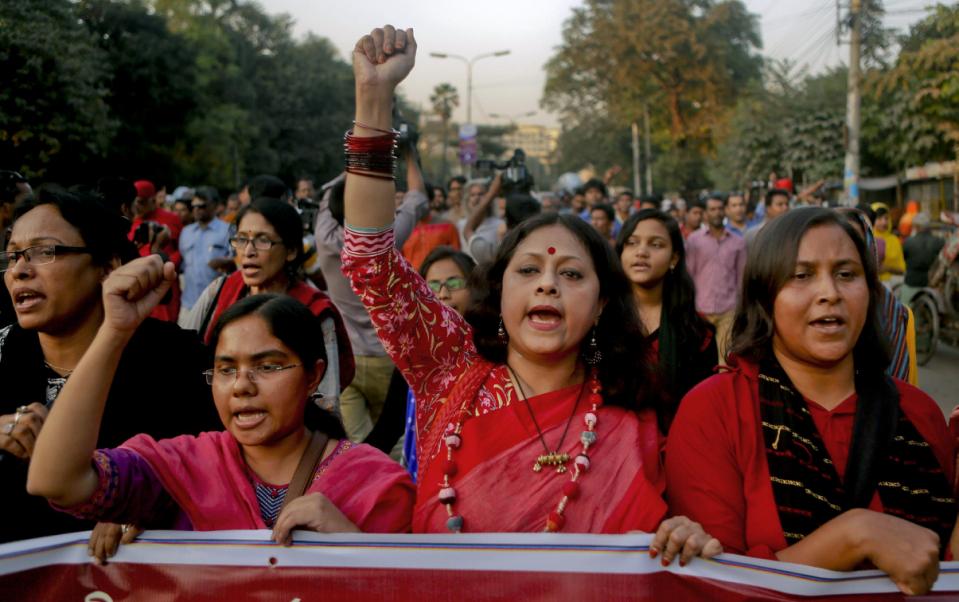
Bangladesh was on high alert Monday after executing two opposition leaders for war crimes during the country’s 1971 independence war, despite threats of violence by their supporters and international concerns that the legal proceedings were flawed.
A reporter was shot and wounded Sunday after covering the funeral of one of the men, though it was not clear who was responsible.
On Monday, paramilitary border guards and thousands of other security officials were patrolling cities including the capital, Dhaka, in an effort to prevent any violence as the South Asian country’s main Islamist party, Jamaat-e-Islami, called for a nationwide strike.
The party is protesting the hanging Sunday of its general secretary, Ali Ahsan Mohammad Mujahid, and Bangladesh Nationalist Party leader Salahuddin Quader Chowdhury.
Mujahid had been found guilty on charges of genocide, conspiracy in killing intellectuals, torture and abduction during the South Asian nation’s independence war against Pakistan, while Chowdhury was convicted on charges of torture, rape and genocide.
Authorities did not expect many to follow the call to strike, given that Jamaat-e-Islami has only about 3 percent of the country’s vote. Nevertheless, authorities were being cautious after a spate of killings claimed by Islamist extremists this year, including the murders of four secular bloggers, a publisher and two foreigners since February.
While there has been concern over the legal process that led to the executions, most leading Bangladeshi newspapers and TV stations supported the hangings.
The leading English-language Daily Star in one story detailed the atrocities for which Chowdhury was convicted. A second story narrated how minority Hindus had been brutally attacked and killed and their homes torched under Chowdhury’s leadership.
Two top Bangla-language dailies, Samakal and Prothom Alo, also published reports demonstrating support for the trials and executions.
A few hours after the men were hanged at Dhaka Central Jail in the nation’s capital, a security detail escorted ambulances carrying their bodies to their homes, where their families were to perform burial rituals.
Rajib Sen, a reporter for the Mohona TV station, was on his way back from Chowdhury’s funeral in Chittagong district when his car was sprayed with bullets, the station said. Three other journalists in the car escaped unhurt, and Sen was rushed to a hospital in Chittagong. The TV station is owned by a member of the ruling Awami League party.
Police would not provide any details on the shooting, and it was not immediately clear who attacked the car.
Last Wednesday, Bangladesh’s Supreme Court upheld the men’s death sentences. President Mohammad Abdul Hamid rejected a clemency appeal on Saturday, clearing the way for the executions, according to both the justice minister and home minister. The families denied that the two men asked for mercy, according to a spokesman.
Jamaat-e-Islami and the Bangladesh Nationalist Party say the trials were politically motivated — an allegation Prime Minister Sheikh Hasina has denied. Two other senior Jamaat-e-Islami party leaders have already been executed for war crimes, among 18 people convicted of war crimes since the tribunal was set up in 2010 — most of them leaders of Jamaat-e-Islami.
The party had campaigned openly against independence for Bangladesh, which was part of Pakistan until the 1971 war. Bangladesh’s government says that Pakistani soldiers, aided by local collaborators, killed 3 million people and raped 200,000 women during the war.
Mujahid, 67, was the head of Islami Chhatra Sangha, then the student wing of Jamaat-e-Islami . He was accused of being the mastermind behind the killing of intellectuals, including teachers and journalists, days before the Pakistani military surrendered to a joint force of freedom fighters and Indian army units on Dec. 16, 1971, after a bloody nine-month war.
Chowdhury, 66, whose father was the speaker of Pakistan’s National Assembly and, at times, the acting president of Pakistan, also actively opposed Bangladeshi independence. He was accused of carrying out war crimes, including killing more than 200 civilians, mostly minority Hindus, during the independence war, according to evidence presented at the tribunal.
In a statement late Sunday, Pakistan’s Foreign Ministry said the men’s trials had been flawed, and that “Pakistan is deeply disturbed” by the executions.
U.S. lawmakers overseeing foreign policy also described the war crimes tribunal, set up in 2013, as “very flawed” and a means of political retribution. Leaders of the House Foreign Affairs Committee, in a letter sent Tuesday to the top U.S. diplomat for South Asia, voiced concern that “democratic space is shrinking” in Bangladesh amid “a growing climate of violence, fear and self-censorship.”
Since February, four secular bloggers, a publisher, and two foreigners — an Italian aid worker and a Japanese agriculture researcher — have been killed in attacks linked to Islamic militants.
The Islamic State claimed responsibility for some of the attacks, but authorities say the Sunni extremist group has no presence in the country. Instead, Hasina has blamed the attacks on the opposition, accusing them of trying to destabilize the country and halt the war crimes trials. Both opposition parties denied the allegation.
Such extremist violence was once rare in Bangladesh, which is mostly Muslim but has a strong secular tradition. Meanwhile, at least a dozen Christian bishops or priests have received death threats by phone or SMS from suspected radical groups, according to a Christian association.
Source: Yahoo
